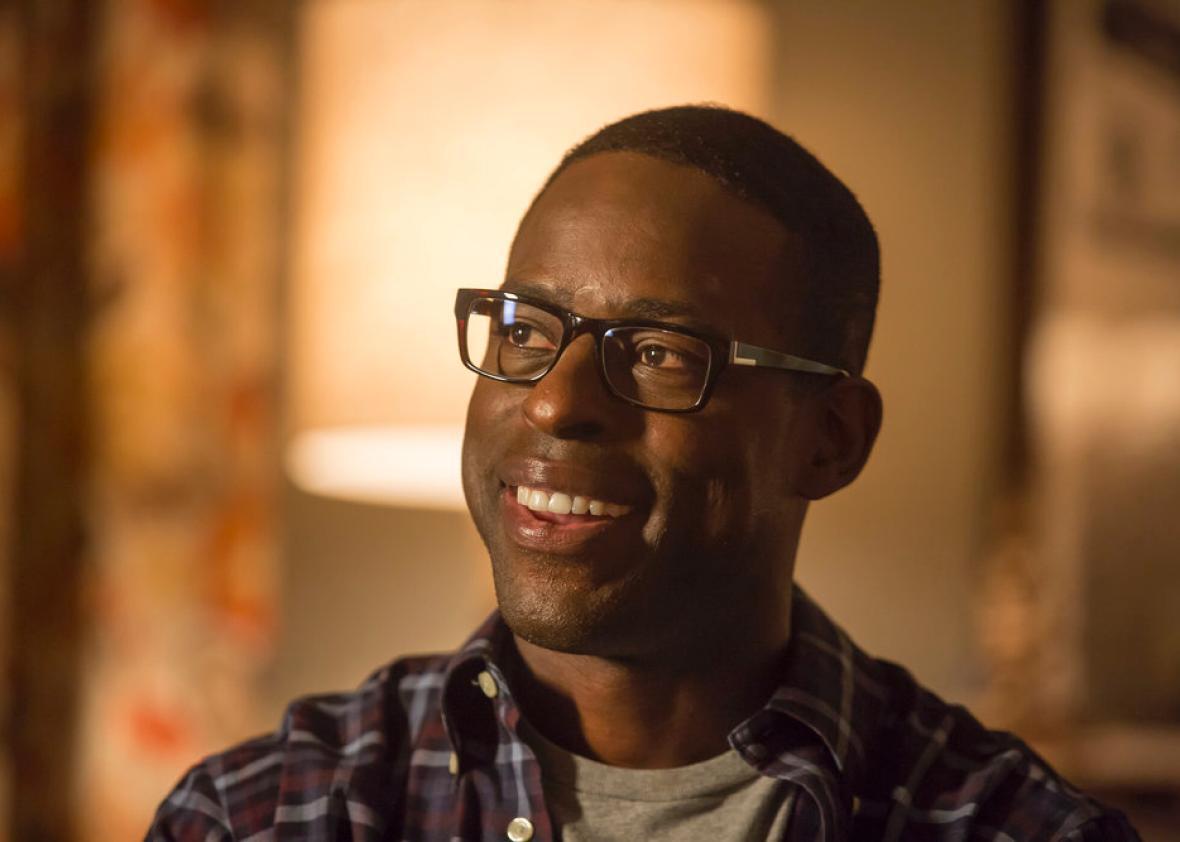Last year, Slate’s Aisha Harris hailed Sterling K. Brown’s performance as Christopher Darden on The People v. O.J. Simpson: American Crime Story for its powerful embodiment of the “double consciousness” involved in being a black man prosecuting one of black America’s greatest heroes. Ryan Murphy’s anthology series boasted bigger names and flashier performances, but Brown’s portrayal was essential for the way he, through Darden, so fiercely and carefully complicated the dichotomous nature of the series’ conflict.
Brown is now a regular cast member on NBC’s runaway hit drama This Is Us. A tearjerker fueled by smartly timed narrative twists, it’s vastly dissimilar in intent and execution from People v. O.J., but Brown’s value to the new show is no less immense. Once again, he’s not only stealing scenes with a strikingly layered performance but emerging as the key to its success.
This Is Us is built around the history of the Pearson family, jumping between time periods as it follows Randall (Brown), his adoptive twin white siblings Kate (Chrissy Metz) and Kevin (Justin Hartley), and their parents, Rebecca (Mandy Moore) and Jack (Milo Ventimiglia). As an adult, Randall is ostensibly living the American dream, residing in a wealthy, mostly white suburb with his wife and two daughters, but his relatively stable existence is marked by an emotionally messy past. We watch him grow up without knowing his birth father and as part of a family who, whatever their intentions, can’t fully relate to his experiences as a person of color.
In both The People v. O.J. and This Is Us, Brown plays characters negotiating their racial identities in predominantly white environments, but where the former is realistic and mostly confined to the public sphere, the latter is a heavy-handed domestic drama, taking moments of devastation and uplift to equal emotional extremes. Like the show, Randall is defined by his complex conception of family. His character arc jump-starts with the unexpected arrival of his dying birth father, William (Ron Cephas Jones), which forces a painful but worthwhile re-examination of his life choices and familial relationships.
In the broader context of This Is Us, this is merely one storyline among many. The show stitches together resonant insights into weight-loss struggles, commitment issues, and class inequality, in addition to racial tensions. Yet despite the gifts of the other cast members—especially Chrissy Metz, who’s outstanding when not saddled with exploitative material—it’s Brown who imbues This Is Us’ saccharine family portrait with the depth and nuance it’s otherwise lacking. In scenes with Rebecca—Randall’s adoptive mother, whom he learns secretly kept William out of his life—Brown forcefully unveils the character’s buried resentment; it gets to the point where a make-up scene between them feels less like the magical healing fix it’s written as than well-intentioned patchwork for a very deep wound. In the show’s Thanksgiving episode, Brown plays Randall’s obsessive maintaining of his adoptive father’s holiday traditions with an intensity that veers between endearing and troubled. The subsequent reveal that Jack died while Randall was just a teenager gives new dimension to Brown’s initial performance—revealing it as a searing and tender reminder of grief’s long, dark shadow.
As a prime-time broadcast drama, This Is Us doesn’t have the artistic latitude of a prestige cable miniseries; while creator Dan Fogelman skillfully plays with the requirements and restrictions of network TV, they’re an unavoidable influence on the finished product. The ingenuity of Brown’s work is how he transcends any and all constraints, taking a simple, neatly delinated scene and muddling it with a stare or a stutter. When Randall learns that his birth father is bisexual, Brown silently conveys nearly a dozen emotions in a few takes, even as the script limits his reaction to explicit, digestible surprise.
The challenges Randall faces are, on paper, more obvious than Chris Darden’s: the betrayal of a mother, the stresses of work-life balance, the return of an estranged parent. This Is Us has a pattern of presenting comfortingly recognizable conflicts before complicating and subverting them, but there’s still the sheen of engineered melodrama, that sense of the gears churning behind the scenes. That’s what makes Brown’s presence so valuable: His textured portrayal seeps into the other characters’ scenes as well, extending Randall’s hard-earned authenticity to the rest of the show. Brown elevates This Is Us above being a timely escapist weepy, lifting it toward something more ambiguous, realistic, and thought-provoking. He makes it human.
